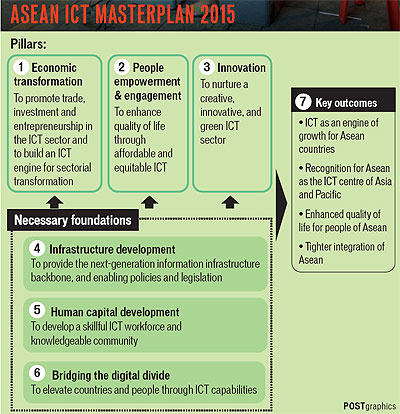Asean is moving ahead with its ICT master plan.
Published at Bangkok Post on 9/05/2012 at 02:17 AM
Thailand’s information and communications technology industry is gearing up for the Asean Economic Community in 2015.

The single market and trade investment cooperation is forcing Thai companies to accelerate the use of ICT.
The development will likely reshape the business models of ICT services, with collaboration among Asean member countries playing a major part.
Companies and and public organisations are mobilising ICT-skilled labour, enhancing connectivity among Asean countries and promoting data exchange via cloud-based systems.
Asean’s ICT industry is growing fast, employing 11.7 million people and contributing US$32 billion, or 3%, to the bloc’s gross domestic product.
To achieve the goal of promoting Asean as a global ICT hub under the Asean’s master plan for ICT, Asean members need to collaborate more on trade and investment promotion, innovations and efforts to bridge the digital divide.
ICT Minister Anudith Nakornthap said Asean is set to become a “smart Asean community” thanks to greater collaboration on development for ICT human capital and cyber-security.
Thailand is playing a leading role in developing skilled ICT workers in the region. The country is also drafting legislation to deal with cyber-crimes, he said.
Methinee Thepmanee, an ICT Ministry inspector, said Thailand stays at the forefront in the area of ICT skill standards in the region, with its software development facilities, ICT project development, enterprise architecture design, network and system administration, and information system and network security.
Pansak Siriruchatapong, executive director of the National Electronics and Computer Technology Center (Nectec), said science and technology is another area in which Asean countries could co-operate, especially in translation software.
He said an Asean subcommittee recently approved Thailand’s proposal to collaborate on the network-based Asean language translation service for the public.
“This is similar to the Google Translate service. The collaboration will fulfil our regional needs,” said Chai Wutiwiwatchai, the head of Nectec’s speech and audio technology lab.
The project is expected to be completed by 2015.
Chaicharearn Atibaeydato, the chairman of CIO 16 Association, said the group together with the ICT Ministry, the Authority for Info-communications Technology Industry of Brunei and the Asean Secretariat held the first Asean CIO forum in Bangkok last month, with the aim of creating a regional CIO network. After the meeting, Brunei will be responsible for the Asean CIO team.
Mr Chaicharearn said a proposal concerning ICT price harmonisation was also raised at the forum. The concept will be proposed to each government to set standard prices for ICT products.
He said Malaysia will likely take the leading role for the Green ICT initiative, while Indonesia, the Philippines and Thailand are potential core leaders for business continuity planning to deal with disasters.
Brunei and Vietnam will take charge of cyber-security collaboration across Asean, said Mr Chaicharearn.
Kosit Suksingha, the managing director of T.C.C. Technology, a data-centre operator, said the Asia Data Centre Alliance _ a group of leading data centre providers from Singapore, Malaysia, Hong Kong, Thailand and Vietnam _ is setting common standards for cloud-based data-centre providers.
Currently, there are no standards for cloud technology.
“All data-centre operators under the group will have to start using a common cloud standard by September,” said Mr Kosit.
He said there will be more collaboration on linking international fibre-optic gateways among each Asean country under the regional gateway connectivity concept.
So far, Hong Kong, Vietnam, Cambodia and Thailand have already been connected, while the remaining six countries are set to join by the end of this year.
Mr Kosit said regional connectivity could reduce cost of international bandwidth by up to 40% and increase speed.
Manoo Ordeedolchest, Sripatum University’s chairman for ICT policy, suggested IT executives at leading enterprises should pioneer in adopting cloud technology to open up new business opportunities.
The government should also promote the using of cloud-based technology on a rental basis to improve competitiveness, especially among small and medium-sized enterprises, he said.
Tidak ada komentar:
Posting Komentar